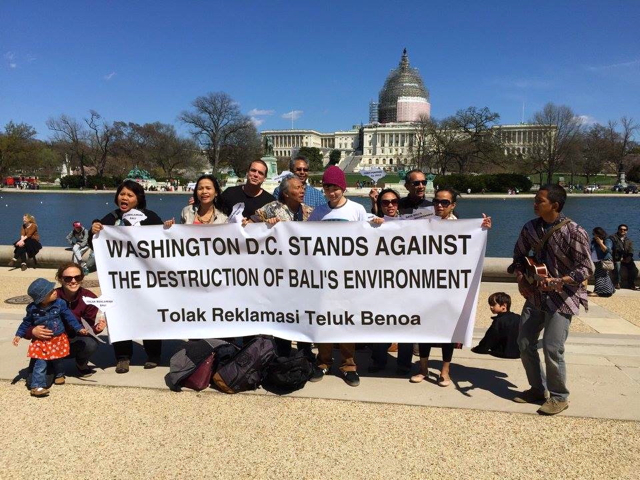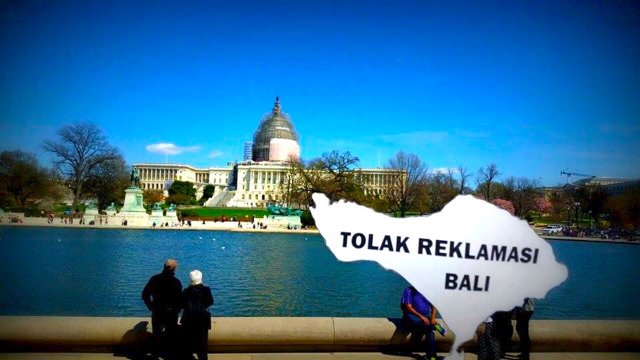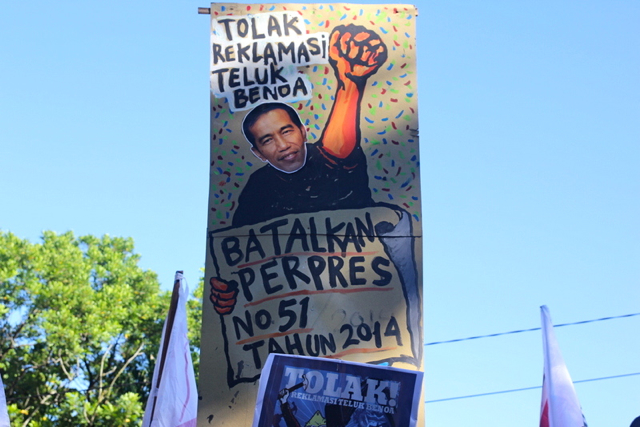
Protesters voice their opposition to the Benoa Bay reclamation project in Washington D.C. Photo: Ika Inggas
Americans and Indonesians demonstrated together in Washington D.C. last week in protest of a massive land reclamation project planned for Bali’s Benoa Bay, to which opposition, activists say, is coming from increasingly international circles.
Meanwhile, the governor of East Java rejected a proposal to dredge sea sand off the Indonesian province’s coast for use in the project, following the launch of a Change.org petition that garnered thousands of signatures. In March, the governor of West Nusa Tenggara province shot down a similar proposal out of ecological concerns.
The East Java areas where the sand would have been dredged – Muncar, Rogojampi and Kabat, all in Banyuwangi regency – are home to some of the country’s most important fisheries, according to the petition. Muncar alone supports 12,714 fishermen, 13 canning operations and 27 freezing operations.
“The dredging of sea sand in Banyuwangi will threaten the sustainability of coastal and sea areas in the region,” the petition read. “Beach and coastal ecosystems such as mangrove forests, coral reefs and seagrass beds as well as biological resources are important to the lives of people here.”
Ecological concerns also hang over the Benoa Bay project. “A handful of people will make big profits from the reclamation, while the people will bear the consequences of the environmental damage,” said Ika Inggas, a protester in Washington. “It’s very unjust.”
She added, “It’s not only the people of Bali who reject the reclamation. This is international.”
Within Indonesia, there have been actions and rejections not just in Bali but in other areas such as Jakarta, Yogyakarta and Solo, from regular people, tourists, academics, artists and musicians.
Made Supriatma, another of the Washington protesters, urged Indonesian President Joko “Jokowi” Widodo to revoke the decree issued by ex-President Susilo Bambang Yudhoyono which cancelled Benoa Bay’s protected status and permitted Tirta Wahana Bali International to go ahead with the reclamation. The company, part of tycoon Tomy Winata’s Artha Graha conglomerate, would create a network of islands to hold luxury residences and hotels, a theme park and a Formula One racetrack.
“You can imagine the profits investors will rake in because the project’s location is a prime spot for tourism in Bali with the most expensive land prices,” Made said.

Protesters display a sign at the Reflection Pool in Washington D.C.’s Capitol Hill. Photo: Ika Inggas
Also last week, the Bali Forum Against Reclamation (ForBALI) demonstrated in conjunction with Jokowi’s arrival at his party’s national conference on the resort island. Protesters wore Jokowi masks and carried posters asking him to reject Yudhoyono’s decree.
“This is a reminder for Jokowi to fight for us,” ForBALI coordinator Wayan Gendo Suardana said. “Many people here chose to vote in the election because we thought Jokowi would fix these policies.” In last year’s legislative contest, Jokowi’s party, the Indonesian Democratic Party of Struggle (PDI-P), won 70 percent of the vote in Bali after a much poorer showing there the previous time around.
ForBALI also imposed its presence by flying its flag on traditional fishing boats in front of the conference venue.
Produced in English by Philip Jacobson.

A sign depicting the Indonesian president at a protest against the Benoa Bay reclamation project in Bali. Photo: Luh De Suryani
Citations:
- Sapariah Saturi and Luh De Suryani. “Seruan Tolak Reklamasi Teluk Benoa dari Washington” Mongabay-Indonesia 13 April 2015.













